|
|
|
Sort Order |
|
|
|
Items / Page
|
|
|
|
|
|
|
| Srl | Item |
| 1 |
ID:
115347
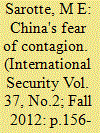

|
|
|
|
|
| Publication |
2012.
|
| Summary/Abstract |
The Tiananmen Square massacre of June 1989 remains a taboo topic in the People's Republic of China (PRC); the ruling Chinese Communist Party (CCP) still detains participants and suppresses online, popular, and scholarly discussions of it. The twentieth anniversary of the end of the transatlantic Cold War, however, saw the release of new sources from high-level contacts between the CCP and foreign leaders. These new sources, combined with older ones, show the extent to which Chinese political leaders were obsessed with the democratic changes in Eastern Europe and were willing to take violent action to prevent similar events on their territory. This obsession has received mention from a few scholars, but until now it has played too small a role in the current understanding of Tiananmen. New evidence documents that one of the main motivations for the CCP in deploying the army in June 1989-on the same day as semi-free elections in Poland-was its desire to combat possible contagion from the events in Europe. These sources also show that the CCP knew it had little to fear from reprisals by the United States, which it predicted would take "no real countermeasures."
|
|
|
|
|
|
|
|
|
|
|
|
|
|
|
|
| 2 |
ID:
115345
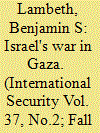

|
|
|
|
|
| Publication |
2012.
|
| Summary/Abstract |
For more than two decades, the pursuit of "lessons learned" from major combat encounters has been an area of sustained activity within the defense establishments of the United States and its principal allies around the world. Yet as often as not, such efforts have, at best, yielded lessons merely indicated and identified, since they cannot be said to have been truly learned until their prescriptions have been accepted and assimilated into an armed service's doctrine, force development, and operating procedures. In one notable instance in late December 2008 and early January 2009, however, an exemplar of lessons learned and incorporated was offered by the twenty-three-day campaign conducted by the Israel Defense Forces (IDF) against the radical Islamist organization Hamas in the Gaza Strip. That performance came on the heels of the IDF's less impressive showing more than two years before against the Iranian-sponsored terrorist movement Hezbollah during Israel's 2006 war in Lebanon. By any measure, Israel's comparative success in Gaza was a direct result of teachings gained and duly incorporated into the IDF's combat repertoire by Israeli civilian and military leaders in response to their earlier misadventure in Lebanon.
|
|
|
|
|
|
|
|
|
|
|
|
|
|
|
|
| 3 |
ID:
115344
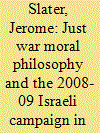

|
|
|
|
|
| Publication |
2012.
|
| Summary/Abstract |
The 2008-09 Israeli military campaign in Gaza, commonly known as Operation Cast Lead, is best understood in the context of Israel's "iron wall" strategy. During the 1930s, the strategy emphasized the need for overwhelming military power to break Arab resistance to the establishment of a Jewish state in Palestine; since the creation of Israel in 1948, it has continued to be at the core of Israeli policies in the overall Arab-Israeli conflict. From the outset, the strategy has included attacks on civilians and their crucial infrastructures. Such attacks violate the just war moral principles of discrimination and noncombatant immunity. In addition, Cast Lead violated the just war principles of just cause and last resort, which state that wars must have a just cause and even then must be undertaken only after nonviolent and political alternatives have failed. Israel did not have a just cause in 2008-09, because its primary purpose was to crush resistance to its continuing de facto occupation and repression of Gaza. Further, Israel refused to explore the genuine possibility that Hamas was amenable to a two-state political settlement. Thus, the iron wall strategy and Operation Cast Lead, in particular, have been political as well as moral failures, undermining rather than serving Israel's genuine long-term security needs.
|
|
|
|
|
|
|
|
|
|
|
|
|
|
|
|
| 4 |
ID:
115346
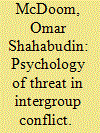

|
|
|
|
|
| Publication |
2012.
|
| Summary/Abstract |
How do security threats mobilize social groups against each other? The strength of such threats lies in the power of group emotions, notably the primary emotion of fear. Fear works by activating psychological processes at the group level that polarize attitudes between different groups. An analysis of survey data, radio broadcasts, and interviews from Rwanda's civil war and genocide of 1990-94 reveals four psychosocial mechanisms at work in group polarization: boundary activation, outgroup derogation, outgroup homogenization, and ingroup cohesion. Additionally, scholarly debates on the role of emotions, material opportunities, and rationality in ethnic conflicts represent a false theoretical choice. Both emotions and material opportunities matter, and rationality and emotion are not incompatible. Two simple refinements to extant theoretical and empirical approaches are needed. First, scholars ought to distinguish between attitudes and violence in ethnic conflicts; emotions matter for the polarization of attitudes, but material and structural opportunities mediate their expression as violence. Second, scholars should pay greater attention to the extensive research in social psychology that shows that both emotion and reason interact in individual judgment and decisionmaking.
|
|
|
|
|
|
|
|
|
|
|
|
|
|
|
|
| 5 |
ID:
115343
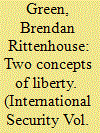

|
|
|
|
|
| Publication |
2012.
|
| Summary/Abstract |
Contrary to conventional accounts, the United States did not immediately adopt a set of sweeping commitments to Europe after World War II. Instead, it pursued a buck-passing strategy until the early 1960s that sought to craft Western Europe into an independent pole of power capable of balancing the Soviet Union largely without the assistance of the United States, thereby facilitating the withdrawal of U.S. troops from the continent. Only under President John F. Kennedy did the United States adopt a balancing strategy, making permanent forward commitments to the defense of Europe. A new theory of liberal ideas and foreign policy explains this shift. "Negative liberals," who see freedom in terms of opportunity and minimal state intervention, adopted a buck-passing strategy to pass the costs of foreign policy to other actors and minimize state intrusion at home. "Positive liberals," who see freedom as the exercise of capabilities and often welcome state intervention, had no such compunctions. Starting with Kennedy, positive liberals welcomed firmer balancing commitments in part as a measure to protect the liberal regimes that had emerged in Western Europe after World War II.
|
|
|
|
|
|
|
|
|
|
|
|
|
|
|
|
|
|
|
|
|